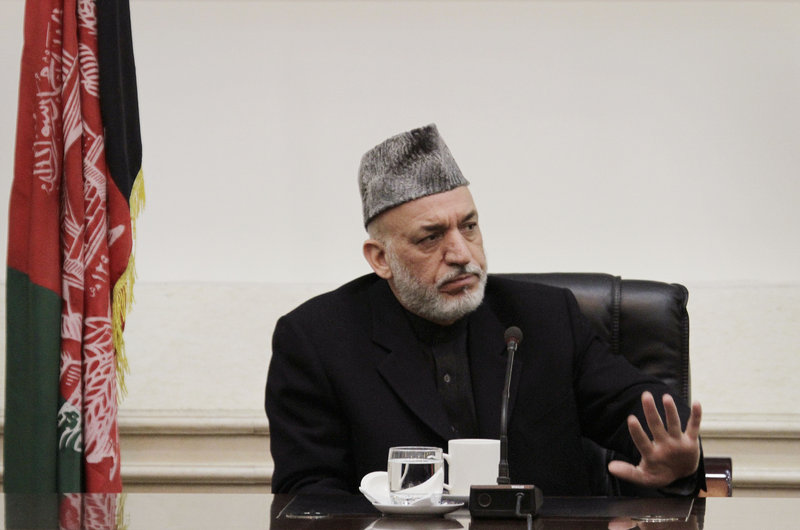After five days cloaked in military secrecy, the soldier suspected in a massacre of 16 Afghan civilians has finally been identified, adding a critical detail to the still-sketchy portrait just beginning to emerge.
A senior U.S. official says the soldier accused in the killings is Army Staff Sgt. Robert Bales.
The official spoke on condition of anonymity because of the sensitivity of the investigation into an incident that has roiled relations with Afghanistan.
Bales, who is 38, is a husband and father of two young children and a veteran who was in the midst of his fourth tour in a war zone. But because of a tightly controlled flow of information, many of the details are incomplete and difficult to verify. Most information about the suspect – before he was identified – has come from two camps, each representing particular interests.
There’s the U.S. government, almost always represented by the voices of unidentified “senior military officials.” On the other side, there’s the civilian lawyer, John Henry Browne, a veteran criminal defense attorney from Seattle, near Bales’ home base.
Until late Friday, both had refused to divulge Bales’ name, placing sharp limitations on efforts to evaluate the information presented about the soldier – no chance to interview family members, close friends, neighbors or fellow soldiers. And no chance to examine official records.
Even seemingly straightforward information raises questions that are not easily answered, at least for now – such as a possible defense of post-traumatic stress disorder.
For example, the suspect now identified as Bales lost part of one foot because of injuries suffered in Iraq during one of his three tours of duty there, his lawyer said. Browne also said that when the 11-year veteran heard he was being sent to Afghanistan late last year, he did not want to go. He also said that a day before the rampage through two villages, the soldier saw a comrade’s leg blown off.
The same goes for the possibility alcohol played a role.
On Friday, a senior U.S. defense official said Bales was drinking alcohol in the hours before the attack on Afghan villagers, violating a U.S. military order banning alcohol in war zones. The official discussed the matter on condition of anonymity because charges have not yet been filed.
Browne said his client’s family told him they were not aware of any drinking problem – not necessarily a contradiction. Pressed on the issue in interviews with news organizations, Browne said he did not know if his client had been drinking the night of the massacre.
The soldier was being flown Friday to the U.S. military’s only maximum-security prison, at Fort Leavenworth, Kan., said a senior defense official, who spoke on condition of anonymity because of security surrounding the move.
The move to the U.S. does not necessarily mean an announcement of formal criminal charges is imminent, a defense official said.
Browne said the Bales is originally from the Midwest but now lives near Joint Base Lewis-McChord in Washington state. His children are 3 and 4.
The sergeant’s family says they saw no signs of aggression or anger. “They were totally shocked,” by accounts of the massacre, Browne said. “He’s never said anything antagonistic about Muslims. He’s in general very mild-mannered.”
Bales, said to have received sniper training, is assigned to the 2nd Battalion, 3rd Infantry Regiment of the 3rd Stryker Brigade Combat Team, of the 2nd Infantry Division, which is based at Lewis-McChord and has been dispatched to Iraq three times since 2003, military officials say.
The soldier was injured twice in Iraq, Browne said. A battle-related injury required surgery to remove part of one foot, the lawyer said.
But Browne and government officials differ in their portrayal of a second injury, to the soldier’s head, in a vehicle accident.
A government official said this week that the accident was not related to combat. But Browne said the man suffered a concussion in an accident caused by an improvised explosive device.
Browne also said his client was “highly decorated,” but did not provide any specifics.
When he returned to the Seattle area, the staff sergeant at first thought he would not be required to join his unit when it shipped out for Afghanistan, the lawyer said. His family thought he was done fighting and was counting on him staying home. Until orders came dispatching him to Afghanistan, he was training to be a military recruiter, Browne said.
“He wasn’t thrilled about going on another deployment,” Browne said. “He was told he wasn’t going back, and then he was told he was going.”
Bales arrived in Afghanistan in December. On Feb. 1 he was assigned to a base in the Panjwai District, near Kandahar, to work with a village stability force that pairs special operations troops with villagers to help provide neighborhood security.
Send questions/comments to the editors.




Success. Please wait for the page to reload. If the page does not reload within 5 seconds, please refresh the page.
Enter your email and password to access comments.
Hi, to comment on stories you must . This profile is in addition to your subscription and website login.
Already have a commenting profile? .
Invalid username/password.
Please check your email to confirm and complete your registration.
Only subscribers are eligible to post comments. Please subscribe or login first for digital access. Here’s why.
Use the form below to reset your password. When you've submitted your account email, we will send an email with a reset code.